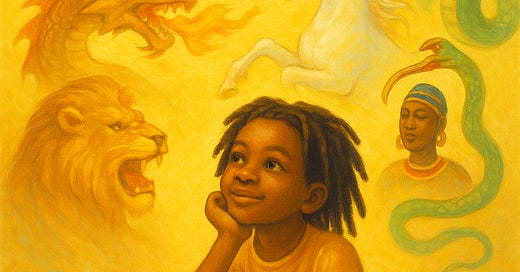Why We Need To Bring Back The Myths
From vaccines to chemical-laced food, to stolen time through technology and life-long debt—the beasts, seductress, and dragons of old still exist. And we still need to destroy them.
I was always a fan of mythology growing up. Some of my earliest and fondest memories were waking up on Saturdays and watching CBS’s TV show on ancient myths.
I was still deeply Christian at the time—Pentecostal at that—so I was being infused with spirituality from the Church at a young age. Even though the myths weren’t “Christian” per se, something spiritual was still drawing me to them.
The term myths is typically associated with Greek mythology, but really, it was any story from ancient civilizations that appealed to me.
I remember, even as a newly fledged adult—about a decade ago—spending my Sundays elevated, with natural light from the sun entering the house while listening to content that delved deep into myths and the stories behind them.
I even wrote to the Academy of Ideas and asked them to do a series on myths. With their fantastic artwork on philosophical principles, imagine if that got tied into the breakdown of mythologies!
Long story short, I loved the myths—the struggle of good against evil, man against the gods, and the determination needed to overcome any trials and tribulations presented.
Heads up: this is just a preview of our members-only deep dives.
To support this work and unlock the full archive, become a paid subscriber below. It’s $5 a month, and you’ll get:
🔓 Full access to premium deep-dive essays every week
🎙️ Exclusive members-only podcast episodes + transcripts
🧠 Early access to new series + behind-the-scenes research
Thanks to social media algorithms, I recently came across the Instagram page of
. The first post I saw that captivated me was “Why JR. Tolkien Hated Disney Movies.” The post goes on to explain how Disney takes folklore material and strips it away from its spiritual depth. Mind you, we’ve discussed the dark occult magic Walt Disney was involved in.In the reel of posts, there’s a quote from G.K. Chesterton that reads:
“Fairy tales do not tell children the dragons exist. Children already know that dragons exist. Fairy tales tell children the dragons can be killed.”
This quote was so powerful that even now, as I type this, it still moves me. Children already know dragons exist—but fairy tales tell the children that dragons can be killed.
That is the power of myths.
As adults, as we’ve grown old, we’ve tossed aside things like fairy tales, imagination, and myths. But for this very reason, I argue why we need to bring back the myths.
As adults, we, too, need to remember that dragons can be killed.
In this article, we discuss two points:
Our society was intentionally shaped to make us forget the myths—and with them, the power they carried. Myths could be seen as the operating system of the human spirit. But through colonization, industrialization, and scientism, we were taught to see them as fantasy—childish relics of a primitive mind. In truth, forgetting the myths was the first step in forgetting who we are.
We must bring the myths back—because seeing the world through a mythic lens isn’t escapism; it’s clarity. Myth reveals the deeper structure of reality: the battles we face, the archetypes we embody, the meaning hidden in our trials. A mythical view of life reconnects us to the soul’s journey—and unlocks the richness of what it means to be truly human.
Withough any further ado, let’s dive right in.
The Veil Of Forgetfulness
Throughout my work, I’ve written extensively on how our mythical reality has been replaced by a materialistic one. In my article on The Religious Tenets of Scientism, I walk through how a systematic takeover of our perspective on reality, one that was deeply spiritual, was replaced—from history to science and more—by a physical one, starting with Descartes.
This subtle change was the first step in removing the mythology from reality.
From the 1500s to the rise of the industrialization age, man needed to be more “scientific,” more “rigorous” in understanding their world—so who had time for “stories?”
Gone were the days of understanding the world from a scientific yet albeit spiritual perspective to now: if it isn’t physical, then it does not exist.
This line of thinking gave rise to man-made conjectures of explanations in an attempt to explain our human experience in man’s terms. It shows how man attempted to be like gods, with examples of conjectures including gravity, evolution, our solar system, and more…
Keep reading with a 7-day free trial
Subscribe to Unorthodoxy to keep reading this post and get 7 days of free access to the full post archives.





